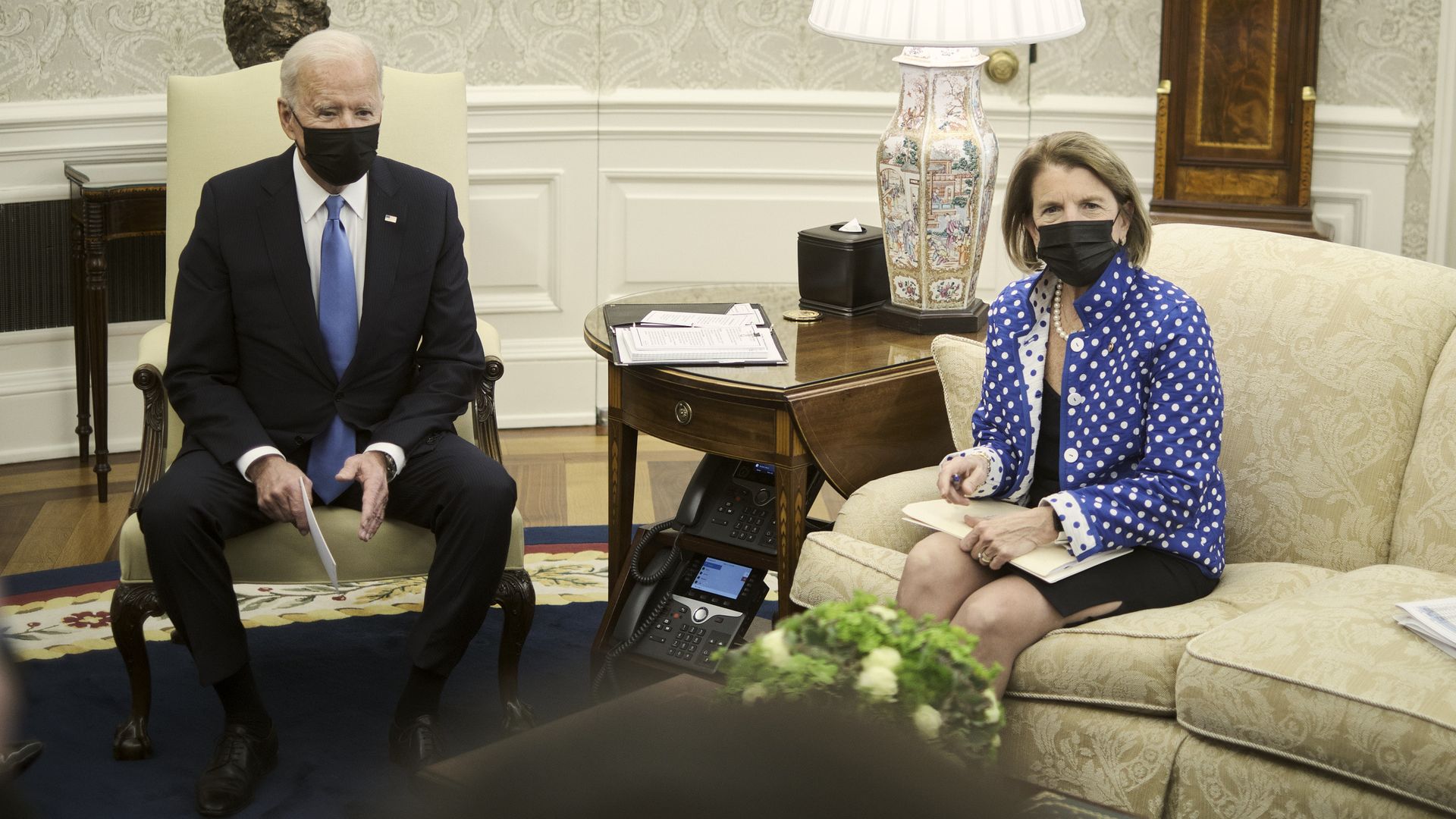Democrats open to user fees for infrastructure deal
Add Axios as your preferred source to
see more of our stories on Google.

President Biden sits Thursday with Sen. Shelley Moore Capito (R-W.Va.) as they discuss his $2.3 trillion infrastructure proposal. Photo: T.J. Kirkpatrick/The New York Times/Bloomberg via Getty Images
Some Senate Democrats are open to paying for a compromise infrastructure package by imposing user fees, including increasing the gas tax and raising money from electric car drivers through a vehicle-miles-traveled charge.
Why it matters: By inching toward the Republican position on pay-fors, some Democrats are bucking President Biden's push to offset his proposed $2.3 trillion plan by focusing only on raising taxes on corporations and the wealthy.
- “User fees have to be part of the mix,” Sen. Mark Warner (D-Va.) told Axios on Thursday.
- “I am generally supportive of what the president is trying to do, but I think his initial unwillingness to include user fees makes it really hard."
- In separate meetings with Biden this week, both Sens. Tom Carper (D-Del.) and Kyrsten Sinema (D-Ariz.) discussed the possibility of imposing user fees, according to people familiar with the matter.
Driving the news: Senate Republicans emerged from their meeting with Biden on Thursday optimistic about a bipartisan deal, focusing on “hard” infrastructure projects like roads, bridges and waterways.
- “We think this infrastructure package can carry forward,” Sen. Shelley Moore Capito (R-W.Va.) said.
- The president agreed: “I am very optimistic that we can reach a reasonable agreement. But even if we don’t, it’s been a good-faith effort that we started.”
- He added: “We didn’t compromise on anything."
- White House press secretary Jen Psaki said: "How to pay for it has long been the area where we need to find more common ground."
The big picture: Senate Minority Leader Mitch McConnell (R-Ky.) and House Minority Leader Kevin McCarthy (R-Calif.) told Biden during their own meeting on Wednesday that they would not support raising either corporate or personal taxes to pay for his spending proposals.
- "We both made that clear to the president. That's our red line," McConnell said.
Between the lines: Some Democrats are opposed to relying on user fees to fund new projects because lower-income Americans would pay a disproportionate share of their income to use the same roads as the wealthy.
- User fees also could be interpreted as a tax increase on Americans making less than $400,000 a year, which Biden promised not to do.
- “Republicans aren't serious about paying for anything,” Sen. Sherrod Brown (D-Ohio) told Axios.
- Complicating negotiations, one likely user fee — a potential increase in the federal gasoline tax — isn't popular in rural states. "Hell no, don't raise them," Sen. Joe Manchin (D-W.Va.) said last month.
Go deeper: Other Democrats want to find a way to explore user fees but make them less regressive.
- “I've asked the commissioner of the IRS to explore for us, whether or not there is a way to somehow give a rebate to lower-income families,” Carper said.
The bottom line: Biden and Republicans have signaled that they first have to agree to the overall size of an infrastructure package and then haggle on how to actually pay it.
- “The good news is, we all want to build on a big robust bill, and we want to pay for it,” Capito said before heading to the White House. “It's incumbent upon us to be very creative.”

